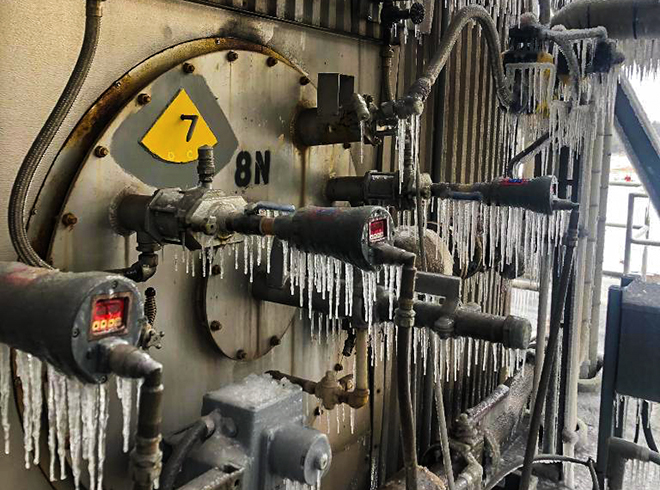Featured Topics
Featured Products
Events
S&P Global Offerings
Featured Topics
Featured Products
Events
S&P Global Offerings
Featured Topics
Featured Products
Events
S&P Global Offerings
Featured Topics
Featured Products
Events
Financial and Market intelligence
Fundamental & Alternative Datasets
Government & Defense
Professional Services
Banking & Capital Markets
Economy & Finance
Energy Transition & Sustainability
Technology & Innovation
Podcasts & Newsletters
Financial and Market intelligence
Fundamental & Alternative Datasets
Government & Defense
Professional Services
Banking & Capital Markets
Economy & Finance
Energy Transition & Sustainability
Technology & Innovation
Podcasts & Newsletters
17 Nov, 2022
By Siri Hedreen

| An Entergy Texas gas-fired power plant is shown covered in ice in February 2021, when a winter knocked out power for millions of people across Texas. |
Electricity supply could be tight this winter, with "a large portion" of the U.S. and Canadian bulk power system at risk of shortfalls during severe weather, according to the North American Electric Reliability Corp.
The warning was sounded in NERC's annual winter reliability assessment, released Nov. 17, which listed higher peak-demand projections, poor weatherization, fuel supply problems, and limited natural gas infrastructure as potential threats.
The risk of potential outages is particularly high in Texas, where in the event of extreme conditions, the Electric Reliability Council of Texas Inc.'s capacity reserve margin could fall to -21.4%, NERC stated.
"What we find is a progression of risk over the last several years, and literally, unlike what we've seen in the past," John Moura, NERC's reliability assessment director, said in a media briefing. "So it's a bit unprecedented. The system hasn't been stressed in this manner in the past, and probably more importantly, it hasn't been as widespread."
Extreme weather, fuel constraints
For Texas and parts of the Midcontinent ISO, the report warned inadequate generator weatherization could lead to outages during extreme or prolonged cold weather.
The report said the combined risk of generator outages, fuel disruption, and volatile demand in cold weather could put ERCOT on thin margins in the event of cold weather. The Texas grid operator could be additionally impacted by a U.S. Environmental Protection Agency decision, expected by the end of 2022, regarding compliance with coal ash regulations that could impact the availability of 1,477 MW of coal-fired capacity.
Meanwhile, the MISO region must make up for 4.2 GW of lost nuclear and coal capacity since the previous winter. Such factors put MISO's reserve margin at -7.6% in an extremely high-demand scenario.
But unlike MISO, ERCOT has fewer interconnections to neighboring regions to draw on during severe weather events like the February 2021 winter storm.
"When you do have extreme or severe winter conditions and generation resource shortfalls, there isn't a lot of external help to be had for ERCOT," Mark Olson, manager of reliability assessments at NERC, told reporters.
Demand growth
Other regions run the risk of energy shortfalls due to growing electricity demand, driven by electrification trends and increased economic activity post-pandemic, Olson said.
The Canadian province of Alberta and a portion of the southeastern U.S. are also at risk of generator-forced outages during extreme cold, NERC said. In the Canadian Maritime provinces of Nova Scotia and New Brunswick, growth in peak electricity demand could strain capacity even during normal winter conditions.
New England utility Eversource Energy has in recent weeks warned about the vulnerability of the regional grid to supply disruptions that could arise from a potential natural gas shortage, and has asked the White House to invoke emergency authority to ensure the availability of gas for power generation.
Recommendations
The NERC report called on state and provincial policymakers and regulators to take action to preserve generation resources.
"If you're in an area where we've identified a risk for the upcoming winter, and you have generation resources that are on track for retirement prior to the winter, I'd encourage [you] to consider extending or keeping those generators around," Olson said.
The assessment already has some calling for slowing down the pace of fossil fuel generation retirements. Two utilities with operations in Wisconsin have this year postponed the planned retirement of some coal-fired assets. The report is a "clear and constant warning about the nationwide consequences of continuing a haphazard energy transition," Jim Matheson, CEO of the National Rural Electric Cooperative Association, said in a statement.
"It doesn't have to be this way," Matheson said, referring to NERC's heightened risk assessment. "But absent a shift in state and federal energy policy, this is a reality we will face for years to come. The pursuit of an energy transition that prioritizes speed over practicality has jeopardized America's ability to keep the lights on."
S&P Global Commodity Insights produces content for distribution on S&P Capital IQ Pro.